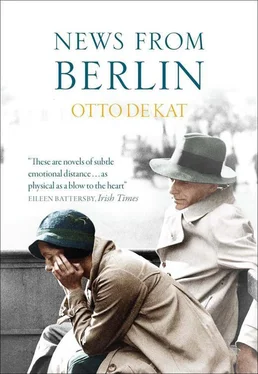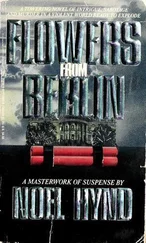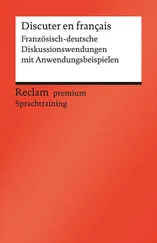Those few hours in the Berne restaurant had passed strangely. From half past eleven until two, when they both had to get back to work. The next day he could not remember whether he had said anything to her that made sense. And Lara had said little. The opening skirmishes with a few poignant remarks had led to a timid exchange of questions and answers, after which a hush had fallen, a mime show in which every movement counted. The least utterance seemed out of place. Even the waiter stayed in the background, observing silence as he served them. At length Lara laid her hand next to her plate, palm up, and they both knew it was time to go. He covered her hand with his, carefully, overwhelmed by the occasion they had created for themselves. The long-deferred touch. His heart pounded, he saw the pulse throbbing at her wrist.
*
The pale soldier opened his eyes. Oscar, sitting diagonally opposite, nodded a greeting. The boy looked outside. The stretch between Bristol and London was familiar to Oscar from the time he visited veterans at their homes as part of the research for his thesis. Veterans from a silent film, survivors of a war that had long been forgotten and long since overlaid by new wars. The boy in his uniform had been drafted in to an age-old system: the call to arms. But he was probably thinking only of his sweetheart, or his parents, or having had to get up at the crack of dawn. Involuntarily, Oscar flicked through the history books stored in his brain. No matter where you lived, they came to get you, young as you were, strong and unafraid. Asia, Africa, Europe, here we come, we will attack, we will not give up. The tragic propensity to interfere, to bring succour, to conquer, to rule. Arrogance was an alcohol brewed in the bosom of families, in churches and schools and clubs. If there was a God, He would have to speak English to make Himself understood, and to give orders. But God seemed a very long way away.
“Right now we need Churchill more than God,” Morton had said during their last encounter. “We call it practical Christianity.” They had met briefly at Morton’s club in August ’39, when Oscar and Kate were looking for somewhere for her to live in London.
From Bristol to London, at each modest little station on the way more passengers took seats in the compartment. Amid the smoke, rustling newspapers, coughs, women’s voices, Oscar and the soldier were absorbed into a run-of-the-mill English morning.
At Paddington Station he telephoned Morton at his ministry: they arranged to meet for coffee at the Travellers Club at Pall Mall. Morton could spare him one hour.
It was raining. Did it ever stop? The rainy season here seemed to go on for twelve months of the year. After the heat of Portugal he was unprepared for this. He shivered in his summer jacket, and had come without a hat, at usual. Shouldn’t he give Kate a ring, let her know he was in London? But she was probably at her hospital by now, no point in disturbing her. He would simply go to Barkston Gardens and wait for her there. “Everything’s fine with Emma, don’t worry,” he would start off by saying, to avoid undue alarm. Thinking ahead came automatically to him, forewarning, assuring that everything was alright. But it was not alright. Everything was a shambles, it was impossible to think straight. Shortly before his departure he had telephoned Lara and told her he had to go to London, there was a meeting he had to attend. He was aware that he did not sound convincing.
“Isn’t that rather sudden? Take care.”
He wished he could hop on the train to Fribourg. Take care, look ahead, then you’ll see me and I’ll see you. A medley of anticipation. Take care. Her voice had been like an embrace.
“Mr Morton is in the garden room. Please follow me.”
Oscar knew the Travellers from the days before he knew Morton. It was a club for diplomats and politicians, established more than a century ago, and of a growth that had kept pace with that of the British Empire. Whitehall not far away, the departments within lunching distance. From the garden room you could see trees and a well-kept lawn, beyond which you knew St James’s Square to be. War or no war, the Travellers served coffee and port at all hours. He entered to find a fire burning in the hearth, the shaded lamps lit, and Morton sitting with his back to the door, sticking his hand up at the sound of approaching footsteps.
“Welcome, Verschuur.”
“Good to see you, Morton.”
Silence.
Morton was a man of few words, a man with a strange fire in his belly. A musketeer. Oscar could tell. It was as if Dick were sitting there, in another guise. His brother, with whom he had lived day in day out until he met Kate. Oscar had existed in the lee of their friendship, where everything went without saying. One day they had divided the world between them, laughing uproariously, with Dick claiming the women and he the poets and philosophers. But it had been Dick who had set out on his own to the East Indies with a trunk full of books. His brilliant, illusion-less brother. Their coffee was served. A small party of men were seated in a far corner, conversing in subdued voices. Through the high windows he saw people strolling past, and he could barely take it all in, the insouciance, the unspeakable complacency of his surroundings, the unperturbed demeanour of the passers-by, the delicate hand-gestures of the staff, Morton’s genial greeting. Annoyance welled up in him at London’s arrogant display of liberty, though it subsided the moment they embarked on their conversation larded with digressions, begged questions, snippets of news of mutual friends, of Wapenaar, of the situation in Berlin. Oscar spoke with the handbrake on, trying to ascertain how much Morton might or might not know. He described the evening at Henderson’s, mentioning that Howard Smith had been present. Morton was keen to hear about Berlin, and about Smith in particular. He asked after Kelly in a conspiratorial tone, and was both surprised and pleased to hear of the Turkish envoy’s involvement. Morton liked things to be raised to the level of intrigue.
The pressure mounted in Oscar’s head. Slowly but surely Morton was fencing him in, inching his way forward to discover the real reason behind this sudden visit to London, reminding him that it was he, Morton, he was talking to, Morton, Churchill’s personal friend and adviser. What was it all about, what was Verschuur up to?
“So Smith mentioned troop concentrations, did he?”
Oscar confirmed, adding that Smith seemed to think Russia could be attacked at any moment. This was it: now was the time to tell him. He glanced around. The group of men sitting by the fire were safely out of earshot. A waiter stood in the doorway like a sentry.
He had gone over every contingency, every coincidence, every sign, suspicion, probability, every ulterior motive, trap, deception. Every single step he might be obliged to take had been plotted, each potential countermove examined. A tangle of possibilities and impossibilities crowded his mind. If he did tell Morton, how could he ever be sure that the information would not be traced back to him? Morton would promise not to name his source, but still, he was bound to inform his agents in Berlin that he had heard, via Switzerland… In his ratiocinations Oscar kept coming back to himself as the only possible source. And from him to Emma, the horse’s mouth. Emma was in danger, she had been seen with him in Geneva, he was under suspicion and therefore so was she, as was Carl – doubly so, because they already suspected Trott, his boss. Their meeting would have been reported back to Berlin, there was no doubt about that. Emma or Barbarossa. It had driven him mad, the despair, the rage, the unutterable sadness. There was no way of reaching Emma and Carl, no question of conferring, suggesting, advising, let alone of warning. Berlin was riddled with listening devices.
Читать дальше












